(完整版)特殊名词变复数
名词变复数的八个规则
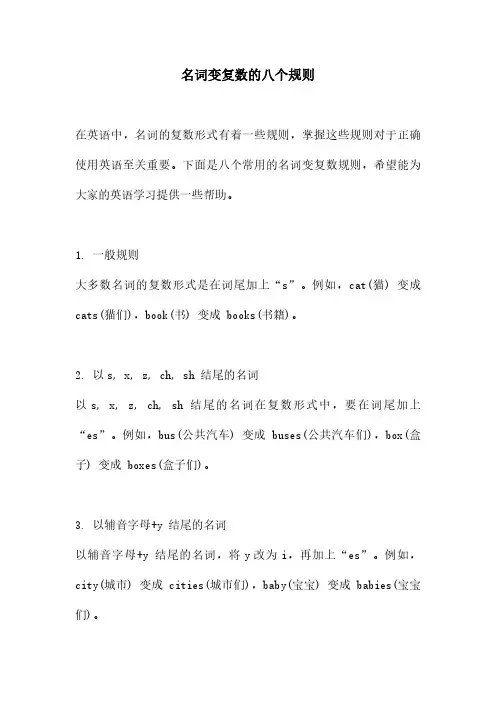
名词变复数的八个规则在英语中,名词的复数形式有着一些规则,掌握这些规则对于正确使用英语至关重要。
下面是八个常用的名词变复数规则,希望能为大家的英语学习提供一些帮助。
1.一般规则大多数名词的复数形式是在词尾加上“s”。
例如,cat(猫)变成cats(猫们),book(书)变成books(书籍)。
2.以s,x,z,ch,sh结尾的名词以s,x,z,ch,sh结尾的名词在复数形式中,要在词尾加上“es”。
例如,bus(公共汽车)变成buses(公共汽车们),box(盒子)变成boxes(盒子们)。
3.以辅音字母+y结尾的名词以辅音字母+y结尾的名词,将y改为i,再加上“es”。
例如,city(城市)变成cities(城市们),baby(宝宝)变成babies(宝宝们)。
4.以元音字母+y结尾的名词以元音字母+y结尾的名词,在复数形式中,只需要在词尾加上“s”。
例如,boy(男孩)变成boys(男孩们),day(天)变成days(天)。
5.以f或fe结尾的名词以f或fe结尾的名词,将f或fe改为ves。
例如,leaf(叶子)变成leaves(叶子们),wife(妻子)变成wives(妻子们)。
6.不变形名词有一些名词的复数形式与单数形式完全相同。
例如,sheep(绵羊)的复数形式也是sheep(绵羊),fish(鱼)的复数形式也是fish(鱼)。
7.不规则名词有一些名词的复数形式是不规则的,需要特殊记忆。
例如,man(男人)的复数形式是men(男人们),woman(女人)的复数形式是women(女人们)。
8.外来词一些外来词在复数形式中没有变化,保持词形不变。
例如,hotel(酒店)的复数形式还是hotel(酒店),computer(电脑)的复数形式也是computer(电脑)。
掌握这些名词变复数的规则,可以帮助我们正确地使用英语,并在交流中避免错误。
当然,除了这八个规则之外,还有一些特殊情况需要特别记忆。
高中英语特殊名词变复数
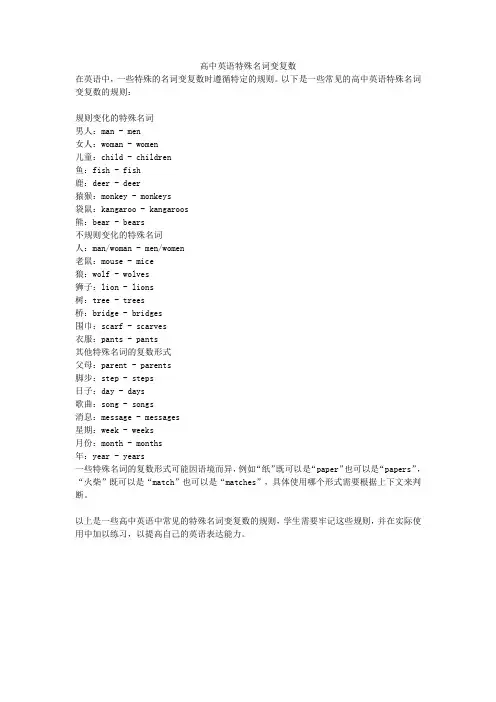
高中英语特殊名词变复数
在英语中,一些特殊的名词变复数时遵循特定的规则。
以下是一些常见的高中英语特殊名词变复数的规则:
规则变化的特殊名词
男人:man - men
女人:woman - women
儿童:child - children
鱼:fish - fish
鹿:deer - deer
猿猴:monkey - monkeys
袋鼠:kangaroo - kangaroos
熊:bear - bears
不规则变化的特殊名词
人:man/woman - men/women
老鼠:mouse - mice
狼:wolf - wolves
狮子:lion - lions
树:tree - trees
桥:bridge - bridges
围巾:scarf - scarves
衣服:pants - pants
其他特殊名词的复数形式
父母:parent - parents
脚步:step - steps
日子:day - days
歌曲:song - songs
消息:message - messages
星期:week - weeks
月份:month - months
年:year - years
一些特殊名词的复数形式可能因语境而异,例如“纸”既可以是“paper”也可以是“papers”,“火柴”既可以是“match”也可以是“matches”,具体使用哪个形式需要根据上下文来判断。
以上是一些高中英语中常见的特殊名词变复数的规则,学生需要牢记这些规则,并在实际使用中加以练习,以提高自己的英语表达能力。
(完整版)复数知识点归纳
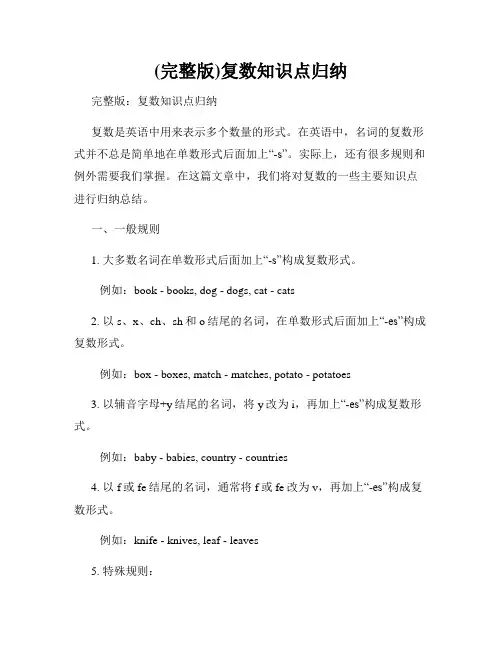
(完整版)复数知识点归纳完整版:复数知识点归纳复数是英语中用来表示多个数量的形式。
在英语中,名词的复数形式并不总是简单地在单数形式后面加上“-s”。
实际上,还有很多规则和例外需要我们掌握。
在这篇文章中,我们将对复数的一些主要知识点进行归纳总结。
一、一般规则1. 大多数名词在单数形式后面加上“-s”构成复数形式。
例如:book - books, dog - dogs, cat - cats2. 以s、x、ch、sh和o结尾的名词,在单数形式后面加上“-es”构成复数形式。
例如:box - boxes, match - matches, potato - potatoes3. 以辅音字母+y结尾的名词,将y改为i,再加上“-es”构成复数形式。
例如:baby - babies, country - countries4. 以f或fe结尾的名词,通常将f或fe改为v,再加上“-es”构成复数形式。
例如:knife - knives, leaf - leaves5. 特殊规则:5.1 不规则名词的复数形式需要特殊记忆,例如:child - children, tooth - teeth, mouse - mice5.2 以-o结尾的名词有一些是按照一般规则加“-s”的,例如:piano - pianos, photo - photos,但也有一些是按照“-es”规则变化的,例如:potato - potatoes, tomato - tomatoes二、特殊名词除了一般规则之外,还有一些名词的复数形式是非常特殊的。
下面列举几个常见的例子:1. 人称代词的复数形式:I - weyou - youhe - theyshe - theyit - they2. 不列举变化的名词:例如:sheep(羊)、fish(鱼)、deer(鹿)等,它们在复数形式和单数形式相同。
3. 以“-is”结尾的名词,复数形式将“-is”改为“-es”:例如:thesis(论文)- theses(论文)4. 以“-us”结尾的名词,复数形式将“-us”改为“-i”:例如:cactus(仙人掌)- cacti(仙人掌)5. 以“-o”结尾的名词,复数形式有时将“-o”改为“-i”,有时加“-es”:例如:photo(照片)- photos(照片),radio(无线电)- radios (无线电)6. 以“-f”结尾的名词,复数形式将“-f”改为“-ves”:例如:leaf(叶子)- leaves(叶子)三、复数形式的用法1. 表示数量:例如:There are three cats in the garden.(花园里有三只猫。
(完整版)小学名词复数形式归纳
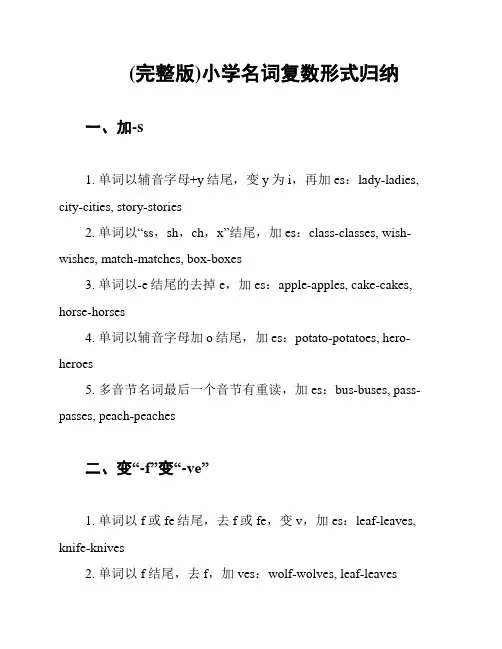
(完整版)小学名词复数形式归纳一、加-s1. 单词以辅音字母+y结尾,变y为i,再加es:lady-ladies, city-cities, story-stories2. 单词以“ss,sh,ch,x”结尾,加es:class-classes, wish-wishes, match-matches, box-boxes3. 单词以-e结尾的去掉e,加es:apple-apples, cake-cakes, horse-horses4. 单词以辅音字母加o结尾,加es:potato-potatoes, hero-heroes5. 多音节名词最后一个音节有重读,加es:bus-buses, pass-passes, peach-peaches二、变“-f”变“-ve”1. 单词以f或fe结尾,去f或fe,变v,加es:leaf-leaves, knife-knives2. 单词以f结尾,去f,加ves:wolf-wolves, leaf-leaves三、不变形式1. 以s,x,ch,sh结尾的,不变:books, boxes, benches, dishes2. 复数形式与单数形式相同:sheep, fish, deer, Chinese四、不可数名词1. 有些名词只有单数形式,没有复数形式,称为不可数名词,如:水,空气,雪等。
2. 不可以在不可数名词前加a或an。
3. 不可数名词没有复数形式。
五、特殊形式1. 存在特殊变化的名词:man-men, woman-women, child-children, tooth-teeth, foot-feet.以上是小学名词复数形式的归纳总结,希望能对学生们的英语研究有所帮助。
名词单数变复数的口诀
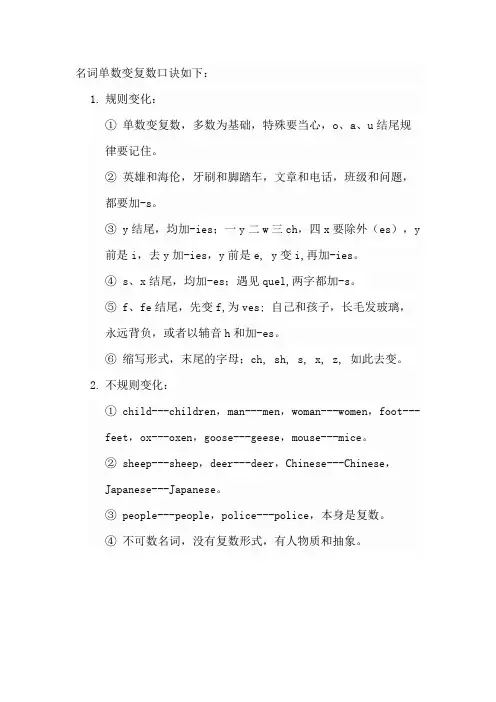
名词单数变复数口诀如下:
1.规则变化:
① 单数变复数,多数为基础,特殊要当心,o、a、u结尾规
律要记住。
② 英雄和海伦,牙刷和脚踏车,文章和电话,班级和问题,
都要加-s。
③ y结尾,均加-ies;一y二w三ch,四x要除外(es),y
前是i,去y加-ies,y前是e, y变i,再加-ies。
④ s、x结尾,均加-es;遇见quel,两字都加-s。
⑤ f、fe结尾,先变f,为ves; 自己和孩子,长毛发玻璃,
永远背负,或者以辅音h和加-es。
⑥ 缩写形式,末尾的字母;ch, sh, s, x, z, 如此去变。
2.不规则变化:
① child---children,man---men,woman---women,foot---
feet,ox---oxen,goose---geese,mouse---mice。
② sheep---sheep,deer---deer,Chinese---Chinese,
Japanese---Japanese。
③ people---people,police---police,本身是复数。
④ 不可数名词,没有复数形式,有人物质和抽象。
特殊名词变化背记清单-——高三英语上学期一轮复习专项
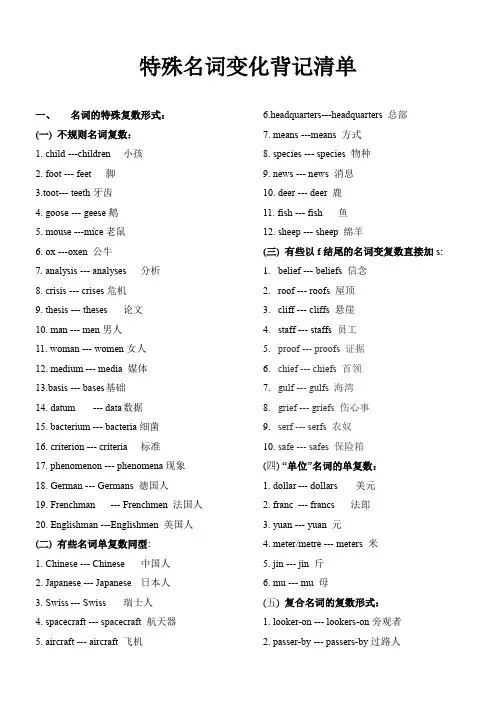
特殊名词变化背记清单一、名词的特殊复数形式:(一) 不规则名词复数:1. child ---children小孩2. foot --- feet脚3.toot--- teeth牙齿4. goose --- geese鹅5. mouse ---mice老鼠6. ox ---oxen 公牛7. analysis --- analyses分析8. crisis --- crises危机9. thesis --- theses论文10. man --- men男人11. woman --- women女人12. medium --- media 媒体13.basis --- bases基础14. datum--- data数据15. bacterium --- bacteria细菌16. criterion --- criteria标准17. phenomenon --- phenomena现象18. German --- Germans 德国人19. Frenchman--- Frenchmen 法国人20. Englishman ---Englishmen 英国人(二) 有些名词单复数同型:1. Chinese --- Chinese中国人2. Japanese --- Japanese日本人3. Swiss--- Swiss瑞士人4. spacecraft --- spacecraft 航天器5. aircraft --- aircraft 飞机6.headquarters---headquarters 总部7. means ---means 方式8. species --- species 物种9. news --- news 消息10. deer --- deer 鹿11. fish --- fish鱼12. sheep --- sheep 绵羊(三) 有些以f结尾的名词变复数直接加s:1.belief --- beliefs 信念2.roof --- roofs 屋顶3.cliff --- cliffs 悬崖4.staff --- staffs 员工5.proof --- proofs 证据6.chief --- chiefs 首领7.gulf --- gulfs 海湾8.grief --- griefs 伤心事9.serf --- serfs 农奴10.safe --- safes 保险箱(四) “单位”名词的单复数:1. dollar--- dollars美元2. franc--- francs法郎3. yuan --- yuan 元4. meter/metre --- meters 米5. jin --- jin 斤6. mu --- mu 母(五) 复合名词的复数形式:1. looker-on --- lookers-on旁观者2. passer-by --- passers-by过路人3. man doctor --- men doctors男医生4. woman teacher -- women teachers 女老师5 brother-in-law -- brothers-in -law 姐夫(妹夫)6. sister-in-law --- sisters-in-law 嫂子(弟媳)7. mother-in-law --- mothers-in-law 岳母(婆婆)8. father-in-law --- fathers-in-law 岳父(公公二、下列名词没有单数形式, 是复数概念,在句中作主语时谓语动词用复数形式:1. clothes2. police3. cattle4. people三、下列名词的单复数含义不同:1. paper纸--- papers试卷,文件,论文2. good 好的--- goods 货物3. ash 灰--- ashes 骨灰,遗骸4. glass 玻璃--- glasses 眼镜5. sand 沙子--- sands 沙滩6. wood 木材--- woods 树林7. green绿色的---greens 青菜8. time 时间--- times 时代9. drink酒--- drinks 饮料10. arm 手臂--- arms 武器11. look看---looks 外表,面容12. line 线--- lines 台词13. manner方式,样式---manners 礼貌,规矩14. work 工作--- works 工厂,作品,工事15. damage 损害---damages 损失赔偿费,费用16. cloth 布--- clothes 衣服17. pain 疼痛--- pains 辛劳,痛苦18. ruin 毁坏--- ruins 废墟19. fruit 水果--- fruits 各种水果20. noise 噪音--- noises 各种噪音21. color 颜色--- colors 各种颜色22. custom 风俗;习惯--- customs 海关23. fish 鱼肉--- a fish鱼24. chicken 鸡肉--- a chicken 小鸡25. tin 锡--- a tin 罐头26. relation 关系--- a relation 亲戚,亲属27. iron 铁--- an iron 熨斗28. beauty 美丽--- a beauty 美人,美的东西29. power 威力;力量;电力--- a power 大国30. room空间--- a room 房间31. glass 玻璃--- a glass 玻璃杯32. success成功--- a success 一个成功的人(事)33. communication 通讯;交流--- communications 通讯系统,通讯工具34. convenience 方便,便利--- conveniences便利设备35. necessity 需要,必要性--- necessities 必需品四、构词法----名词和动词的相互转化:1. 很多动词可以转化为名词:1) have a look ( chat, talk, wash, swim, rest, try, quarrel, interview, taste, slip, ect.)2) make a study ( guess, call, survey, change, answer, slip, visit, appointment ect.)3) come to a stop (a pause, an end, ect.)2. 有些名词也可当动词用:1) Have you booked your ticket? (预订)2) The hall can seat two thousand people. (容纳)3) We’ll back you up. (支持)4) We’ll head for Shanghai tomorrow. (朝….前进)5) If so, you will be badly fooled. (上当,愚弄)6) They were hosted by the members of the embassy. (招待)7) This helped to bridge over our difficulties. (度过)8) Over three hundred students stormed into the building. (涌入;冲进)五、注意下列动词形容词变化的名词:1. grow growth2. warm warmth3. true truth4. repeat repetition5. describe description6. argue argumentpete competition8.necessary necessity9.recognize recognition10.decide decision11.confuse confusion12.divide division13.relax relaxation14.pronounce pronunciation15.propose proposal16.arrive arrival 17.refuse refusal18.survive survival19.remove removal20.approve approval21.proud pride22.dry drought23.permit permission24.discover discovery25.speak speech26.fortunate fortune27.differ difference28.strong strength29.marry marriagerm information31.popular popularity32.succeed success六、用名词的正确形式填空:1.There are two ____________ (box) of ____________ (match), three ____________ (knife), four____________ (brush), five ____________ (key), six ____________ (photo), seven ____________ (dictionary), eight ____________ (tomato), nine ____________ (glass), ten ____________ (radio) and eleven ____________ (toy bus) on that table.2.Look at those ____________ (wolf), ____________ (sheep), ____________ (deer), ____________(fox), ____________(ox) ____________ (monkey), and ____________ (goose).3.Who are they? They are all ____________ (hero). And they are all ________________ (woman doctor)4.There are so many public____________ (convenience) in cities .5.Three ____________ (Swiss), two ____________(German) and five _____________(Frenchman) arepresent at the meeting.6.Those little _____________(child) are playing with those little____________ (mouse).7.The rainbow is one of the most beautiful ____________ (phenomenon) in nature.8.Two____________(aircraft) and two__________(spacecraft) are being designed in the___________(headquarters).9.We have tried all the ________(means), but not every_________(means) has worked.10.It tastes like________(chicken). Do you raise ________ (chicken)?11.He regarded music as one of life's ____________ (necessary).12.They took great __________ (proud) in their excellent children.13.English __________________ (pronounce) is terribly difficult.14.The job involved the constant _____________ (repeat) of the same movements15.The police have issued a detailed ______________ (describe) of the missing woman.16.The ____________ (consume) of alcohol on the premises(经营场所)is forbidden.17.Sometimes there's a lot of ____________ (compete) between children for their mother's attention.18.There is general_________ (recognize) that the study techniques of many students are weak.19.The news aroused a lot of _____________ (curious) among local people.20.The fear of unemployment can be a source of deep ___________ (anxious) to people.21.I think the government has lost touch with___________ (real).22.The lake has more than 20 _______________ (vary) of fish.23.We need an effective strategy to fight ____________ (poor).24.This latest interview was further __________ (prove) of how good at her job Cara was.25.Several members hold very right-wing _________(believe) .26.This year (a) severe ___________ (dry) has ruined the crops.27.With seven people squashed(塞入)in one house, you don't get much ___________ (private).28.In most people’s eyes, she was nothing more than a common ___________ (crime).29.It was his ___________ (brave) that saved the child.30.Meditation allows you to enter a state of deep_____________(relax) .31.The thought occurred to me that he might not be telling the _________(true).32.All at once they were aware of the evening of light and___________ (warm).33.We finally came to a firm _________ (decide) on the matter.34.The French government has approved ___________ (propose) for a new waste law.35.The party hopes to win the _____________ (argue) about how to reform the health systemkey名词key: 1. boxes, matches, knives, brushes, keys, photos, dictionaries, tomatoes, glasses, radios, buses2. wolves, sheep, deer, foxes, oxen, monkeys, geese3. heroes, women doctors4. conveniences5. Swiss, Germans, Frenchmen6. children, mice7. phenomena 8. aircraft, spacecraft, headquarters9. means, means 10. chicken, chickens11. necessities 12. pride 13. pronunciation 14. repetition 15. description 16. consumption17. competition 18. recognition 19. curiosity 20. anxiety 21. reality 22. varieties23. poverty 24. proof 25. beliefs 26. drought 27. privacy 28. criminal 29. bravery30. relaxation 31. truth 32. warmth 33. decision 34. proposals 35. argument高考质量提升是一项系统工程,涉及到多个方面、各个维度,关键是要抓住重点、以点带面、全面突破,收到事半功倍的效果。
特殊名词单数变复数
名词单数变复数第二部分:不规则变化我们经常会看到有些名词变复数时并没有遵循上述规则。
这就是名词的不规则变化。
我们经常看见的有man-men,woman-women,child-children 等等。
还有一些名词,单复数是同一个形式的。
不过,我们还是可以通过一些比较,发现其中的一些奥妙。
一、以-us结尾的名词(多为外来词),通常将-us改变为-i构成复数。
读音变化:尾音[əs]改读[ai],其中[kəs]要改读为[sai],[gəs]要改读为[g ai].例: fungus→fun gi真菌abacus→abac i算盘focus→foc i;焦点cactus→cact i;仙人掌cestus→cest i腰带,紧身腰带,牛皮手套二、以-is结尾的名词,通常将-is改变为-es.读音变化:尾音[is]改读[i:z].例: ax is→ax es;轴承basis→bas es;根基naris→nar es; 鼻孔hypothesis→hypothes es;假说restis→restes 绳状体,索状体三、以-ix结尾的名词,通常将-ix改变为-ices,但有例外.读音变化:尾音[iks]改读[isi:z].例: matrix→matri ces; 矩阵directrix→directri ces; 准线,准曲线calix→cali ces;杯、盏,圣餐杯appendix→appendi ces 附录affix→affix es 词缀Prefix 前缀Suffix 后缀Root 词根四、以-um结尾的名词;将-um改变为-a.读音变化:去掉鼻尾音[m].例: forum→fora;【ˈfɔːrə】讨论会,论坛stadium→stadia; 体育馆aquarium→aquaria;水族馆datum→data;数据vacuum→vacua 真空容器;真空吸尘器bacterium→ bacteria 细菌,病原体五、以-a结尾的名词,在该词末尾加上后辍-e.读音变化:尾音[E]改读[i].例: larva→larva e; 读【ˈlɑːviː】幼虫formula→formul ae;读作【ˈfɔːrmjuːliː】公式ala→alae;【`eili】翼状结构,翅状物Media 【midiə】→mediae;[`mediə] 媒体,传媒hydra→hydrae /ˈhaɪdriː/九头蛇六、部分单词的复数形式不变.读音变化:保持原音.例:fish→fish;sheep→sheep;cattle→cattle; 牛deer→deer; 鹿子salmon→salmon鲑鱼,三文鱼七、极少数单词,其复数形式没有任何规律.读音变化:没有规律.例: man→men;woman→women;child→children;person→person sPeople → people; 单复数相同ox一oxen八、八、一些单数词得加en才能变成复数词:例: ox→oxen; 公牛child→children;brother→brethr en同胞们九、九、一些单数词得改头换面一番,才能变成复数词例: analysis→analy ses分析;an alyze v.分析basis→bases基础;datum→data数据;foot→feet; 英尺formula→formulae/formulas 公式;goose-g ee se; 鹅louse→lice虱子;man→menmouse→mice;老鼠rat → ratsmedium→media/mediums媒介;memorandum→memoranda /memorandums备忘录;parenthesis→parentheses圆括号;phenomen on→phenomen a现象;radius→radii半径读【ˈreɪdiaɪ】tooth→teeth; 牙齿woman→women 【ˈwɪmɪn】Alumnus ---alumni读音【əˈlʌmnaɪ】毕业生,校友十、有些名词是单数、复数不分的,单、复数相同例: deer, fish; cannon或cannon s加龙炮; sheep; salmon鲑鱼; trout蹲鱼十一、一些名词虽分单数、复数,但出现次数多的总是单数词例: abscence; 缺席clothing; 衣服Film → film s;Help 单复数相同help或help s;furniture家具(不可数名词); machinery(不可数名词)机械; machine(可数名词)机器→ machines机器news;新闻(单复数相同)A piece of news 一则消息1 news item新闻报道2 news items 两则新闻报道scenery风景; 其复数:sceneriessugar;糖不可数名词Traffic vehicle s交通Transportation 运输立交桥flyover(天桥),(美语)overpass天桥,highway interchange(高速公路互通立交桥)人行天桥pedestrian bridge=pedestrian overpass(flyover)=foot bridge人行横道pedestrian crossing 斑马线zebra crossingpedestrian 行人,不行者;十二、另一些名词则以复数词出现的机会较多例: bellows风箱;clothes; + are 衣服police;警察shorts短裤;scissors剪刀;spectacles眼镜;shears大剪刀trousers长裤;wages工资+ areSavings 积蓄+ are十三、compound nouns,合成词,这类复数词是以主要的名词来表示例: daughter-in-law→daughter s-in-law媳妇;father-in-law→father s-in-law岳父man-of-war→m e n-of-war兵舰;maid-servant→maid-servant s女佣step-son→step-son s晚子;继子son-in-law→son s-in-law 女婿Looker-on → looker s-on 旁观者十四、若表达具体数目,要借助数量词例: pair(对,双);suit(套);a pair of glasses + is;一副眼镜pair决定单复数two pairs of trousers are十五、另外还有一些名词,其复数形式有时可表示特别意思,例: goods货物,waters水域,fishes(各种)鱼Peoples 民族十六、除人民币元、角、分外,美元、英镑、法郎等都有复数形式.例: a dollar, two dollar s; a meter, two meter sCurricul um--> curricul a / curriculum s学校的全部课程,(—门)课程Co curriculum - cocurricul a /cocurriculums 辅助课程Curriculum Vitae【ˈviːtaɪ】=CV 个人简历,= resume v.【rɪˈzjuːm】继续;n.【ˈrezjuːmeɪ】简历,履历表,。
英语中名词单数变复数规则
英语中名词单数变复数规则在英语里面,名词分可数名词(countable noun)和不可数名词(uncountable noun)。
不可数名词没有单复数之分,用时只当单数词用;可数名词有单复数之分,一个的前面要用a或an,eg:a pencil,a basketball,a dictionary,an egg,an ID card,而复数即两个或两个以上的要作相应的变化,情况如下:(1)一般的词在单数词后直接+“s”book→books,pen→pens,car→cars,map→maps,cartoon→cartoons(2)以s,x,sh,ch结尾的词+“es”box→boxes,watch→watches(3)以辅音字母+y结尾的名词去掉“y”,改成“i”,再加“es”family→families,comedy→comedies(4)以f或fe结尾的词,先去掉f或fe,改成“v”再加esknife→knives,wife→wives,handkerchief→handkerchieves(5)特殊词,特殊变化,需单独记:child→children,man→men,foot→feet,woman→womentooth→teeth,sheep→sheep,deer→deer2.既是可数名词又是不可数名词的单词chicken当“鸡肉”讲时是不可数,当“小鸡”讲时可数;room当“空间”讲时不可数,当“房间”讲时可数;fish当食物用“鱼、鱼肉”讲时不可数,当“鱼的种类”讲时可数;hair泛指“毛发”时不可数,当“一根或几根毛发”讲时可数;sound意思是“一般性的声音”时,不可数,指“一次发出的声音”时可数;paper当“纸”讲时不可数,当“试卷”、“论文”、“证件”讲时可数;time当“时间”讲时不可数,当“时代、倍数、次数”讲时可数;exercise泛指“锻炼”时不可数,当“练习、做操”讲时可数。
名词的几种特殊形式的复数形式
名词的几种特殊形式的复数形式1. 复合名词的复数形式通常是将其主要名词变为复数:passer-by / passers-by 过路人shoe-maker / shoe-makers鞋匠looker-on / lookers-on 旁观者father-in-law / fathers-in-law 岳父若没有主要名词,则通常在最后一个词尾加s:go-between / go-betweens 中间人,媒人know-all / know-alls 万事通【注】由man / woman用于另一名词前构成的合成名词,两者均变为复数:man doctor / men doctors 男医生woman writer / women writers 女作家2. 字母、文字等的复数形式原则上加词尾-’s:There are two i’s in the word “skiing”. skiing这个词里有两个字母i。
Mind your p’s and q’s. 要谨言慎行。
All the –’s should be changed to +’s. 所有的负号应改为正号。
若不至于发生混淆,也可只加词尾-s:He was born in the 1930(’)s. 他出生在20世纪30年代。
Your 3(’)s look like 8(’)s. 你写的3看起来像8。
3. 度量衡单位缩写词的复数形式情况比较复杂:有的变复数时通常不加词尾-s,如m(米), g(克), kg(千克)等;有的变复数时通常不加词尾-s,如hr(小时), No(号码)等;有的变复数可加词尾-s也可不加,如km / kms(千克), cm / cms(厘米)等。
有个别缩写词采用双写缩写字母的方式构成复数形式:p.10 (第10页),pp.10-15 (第10至15页)。
初中英语中名词复数地不规则变化
初中英语中名词复数的不规则变化一、绝大多数的可数名词的复数形式,是在该词末尾加上后辍-s。
读音变化:结尾是清辅音读[s],结尾是浊辅音或元音读[z]。
例:friend→friends; cat→cats; style→styles; sport→sports; piece→pieces二、凡是以s、z、x、ch、sh结尾的词,在该词末尾加上后辍-es构成复数。
读音变化:统一加读[iz]。
flash→flashes 例:bus→buses; quiz→quizzes; fox→foxes; match→matches;三、以辅音字母+y结尾的名词,将y改变为i,再加-es。
读音变化:加读[z]。
例:candy→candies; daisy→daisies; fairy→fairies; lady→ladies;story→stories四、以-o结尾的名词,如果不是外来词或缩写,就加-es,否则加-s构成复数。
读音变化:加读[z]。
(鱼雷)→torpedoes; bingo 例:tomato→tomatoes; potato→potatoes; torpedo(宾果游戏)→bingoes(外来词); photo→photos; macro→macros 反例:silo→silos; piano→pianos(缩写词)五、以-f或-fe结尾的名词,多为将-f或-fe改变为-ves,但有例外。
读音变化:尾音[f]改读[vz]。
例:knife→knives; life→lives; leaf→leaves; staff→staves; scarf→scarves 反例:roof→roofs六、以-us结尾的名词(多为外来词),通常将-us改变为-i构成复数。
读音变化:尾音[?s]改读[ai],其中[k?s]要改读为[sai],[t?s]要改读为[stai]。
例:fungus→fungi; abacus→abaci; focus→foci; cactus→cacti; cestus→cesti 七、以-is结尾的名词,通常将-is改变为-es。
- 1、下载文档前请自行甄别文档内容的完整性,平台不提供额外的编辑、内容补充、找答案等附加服务。
- 2、"仅部分预览"的文档,不可在线预览部分如存在完整性等问题,可反馈申请退款(可完整预览的文档不适用该条件!)。
- 3、如文档侵犯您的权益,请联系客服反馈,我们会尽快为您处理(人工客服工作时间:9:00-18:30)。
名词的词形变化
1.不规则复数形式
1)来自古英语的复数形式,如:
child---children foot---feet tooth---teeth
goose---geese man---men woman---women
mouse---mice louse---lice ox---oxen
penny---pence analysis---analyses appendix---appendices parenthesis---parentheses basis---bases stimulus---stimuli ellipsis---ellipses axis---axes hypothesis---hypotheses oasis---oases crisis----crises criterion---criteria phenomenon---phenomena datum---data medium---media bacterium---bacteria nucleus---nuclei fungus---fungi alumnus---alumni focus---foci radius---radii
terminus---termini larva---larvae alga---algae
formula---formulae data---datas lens---lenses。
2)词尾读音为[f]并以-f或0-fe结尾的名词复数形式有以下几种情况:
a)规则形式:
belief---beliefs chief----chiefs cliff----cliffs
grief----griefs
b)不规则形式,即把-f或-fe变成-v,再加-es,读音为[vz]:
calf---calves half---halves leaf----leaves
life----lives loaf---loaves self---shelves
thief---thieves wife---wives wolf---wolves
c)既可是规则形式又可是不规则形式:
dwarf---dwarfs/dwarves hoof---hoofs/hoves
scarf---scarfs/scarves wharf---wharfs/wharves
3)词干以-o结尾的名次有三种情况:
a)附属形式为-s:这类词包括缩略词kilos, photos;表示国籍或民族的词Filipinos, Eskimos以及radios ,solos, sopranos, studios
b)复数形式为-es,如:heroes, potatoes, tomatoes, Negroes。
c)复数有规则的和不规则的两种形式,如:
cargo---cargos/cargoes mosquito---mosquitos/mosquitoes
volcano---volacbos/volcanoes
2.单复数同形的名词
1)某些动物名词,如:deer, grouse, salmon, trout, carp, bison, sheep等
2)以-ese或-ss结尾的表示民族或国籍的名词,如:Chinses, Japanese, Portuguese, Swiss, Vietnamese等
3)某些以-s结尾的名词,如:barracks, corps, crossroads, gallows, headquarters, means, series, species, works等
4)某些表示计量单位的名词,如:horsepower, hertz, kilohertz, li, mu等
其他一些名词,如:aircraft, spacercarft, craft, offspring等。
其中请特别注意-s结尾的单复数同形的名词,它们是考试的重点!!
3.不可数名词
不可数名词前一般不需要加定冠词,永远不能加不定冠词!
不可数名词作主语,谓语要用单数形式。
如:Water is important.
但如果不可数名词前面被piece, drop, set等词修饰时,谓语应该与piece, drop, set等的单复数形式保持一致
例如:Few drops of water are needed to save the flower.
下面是典型的不可数名词,是应该熟记的!!
air,smoke,steam,vapor,hydrogen,oxygen,nitrogen,water,oil,soup,juice,ink,rain, snow,ice,tea,coffee,wine,sunlight,sunshine,
lightning,thunder,weather,darkness,heat,light,electricity,energy,power,sugar,s alt,rice,corn,powder,flour,sand,dust,dirt,
garbage,grass,hair,furniture,luggage,clothing,mail,equipment,food,meat,fruit,b read,toast,stone,iron,copper,chalk,paper,
glass,wood,money,poetry,jewelry,machinery,weaponry,personnel,scenery,ha ppiness,kindness,honesty,friendship,attention,wi
sdom,success,courage,bravery,health,wealth,ignorance,trouble,ease,luck,lau ghter,love,peace,news,information,knowledge,
intelligence,fun,pleasure,entertainment,enjoyment,recreation,relaxation,progre ss,room,work,homework,population,percent,
mathematics,econmics,statistics,meteorology,anthropology,architecture,physi cs,photography,ethics,politics,mechanics,
genetics,geology,geography,chemistry,philosophy,biology,history,music,Engli sh,measles,mumps,diabetes,malaria,pediatrics,
obsterics。
